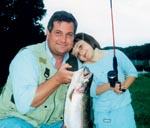Interview: Waitrose MD Mark Price
The son of a grocer who began work with the John Lewis partnership in 1982, Mark Price explains how Waitrose is the only supermarkets who owns a farm and plans this year to strengthen the local identity of each store


The managing director of Waitrose Mark Price, who has headed the supermarket since last April, is proud of his chubbiness. 'I do try to eat every new line that we bring in,' he grins. When he pushes a trolley around one of the Waitrose branches, which he does at least once a week, the 47-year-old son of a grocer, who began work with the John Lewis partnership as a callow graduate trainee in 1982, is also testing how easy the store is to shop in. 'The average consumer has a food world of 250 items, but we sell more than 20,000.' If he wasn't the managing director, he would probably be the typical customer: he lives in Berkshire with his wife and two daughters, shoots, fishes and plays golf. He's full of statistics, delivered with a down-to-earth informality. Eighty-two per cent of customers are women. Although a relative supermarket minnow with a 4% market share, Waitrose has 10% of the UK's fish sales, and an 18% market share of organic food. It is the 4% figure that's driving his vision for the next 10 years.
Apparently, there are six million people who want to shop at Waitrose, but aren't near enough to a store. This desire to expand resulted in a recent spat with the head of Tesco, Terry Leahy. Tesco is stamping out competition, said Mr Price. Tesco was furious, but he refused to back down. The referee's decision will be final when the Competition Commission rules in February. It has already indicated that it's not happy with the idea of a food monopoly, and that planning laws should ensure a diversity of suppliers in each area. If, for instance, Asda has a store in a town, it will not be allowed to have another site there. 'I feel that the number one responsibility of any government is to defend its people, and the second is to feed its people. You only have to look at the floods we had last summer and the panic scenes we had in the supermarket to see what happens if food distribution starts to fall down. I would feel very uncomfortable if you had one player in the UK taking a really dominant market share and a few people being solely responsible for food distribution.'
Supermarkets are often accused of ignoring the plight of farmers and squeezing them on price. Mr Price points out that Waitrose is the only one to have its own farm, a 4,000-acre estate in Hampshire, including an 800-strong dairy herd. 'I'm responsible for the farm in the same way I'm responsible for the shops, so I have a really good understanding of what's going on. We're arable farmers, too, and grow poppies under licence. I think it's hugely important. We understand the plight of farmers, so we went into subsidising dairy farmers very early on. We've underwritten the price of lamb and we'll ensure that, over the next five years, our beef payments go up so that our beef farmers are secure. When our apple farmers in Kent were hit early last year with hailstorms,we said that we would still buy the crop, package them as hail damaged, and sell them for slightly less. What we did not say is that we were not going to take them.' British food gets a good showing.
Mushrooms, beef, pork, and lamb (in season) are 100% British: 'We do source everything we possibly can from the UK.' The amount of regional and local food is increasing in each store, particularly cheeses, fruit, vegetables and breads. Even in the big new Waitrose food hall in John Lewis on Oxford Street, a farmer's market atmosphere prevails. The ladies on the cheese counter may be employees, but they talk about the large variety on offer such as Cornish Brie and caveaged Emmenthal with genuine enthusiasm. There are also plans this year to strengthen the local identity of each store in the same spirit of using local food.
'There is going to be a greater reflection of communities in each shop. If you talk to people, it's their local Waitrose, it's not Waitrose the chain. We think we can do a lot more.' That last sentence may well reflect the general policy for 2008.
Sign up for the Country Life Newsletter
Exquisite houses, the beauty of Nature, and how to get the most from your life, straight to your inbox.
Country Life is unlike any other magazine: the only glossy weekly on the newsstand and the only magazine that has been guest-edited by HRH The King not once, but twice. It is a celebration of modern rural life and all its diverse joys and pleasures — that was first published in Queen Victoria's Diamond Jubilee year. Our eclectic mixture of witty and informative content — from the most up-to-date property news and commentary and a coveted glimpse inside some of the UK's best houses and gardens, to gardening, the arts and interior design, written by experts in their field — still cannot be found in print or online, anywhere else.
-
 From Vinted to Velázquez: The younger generations' appetite for antiques and Old Masters
From Vinted to Velázquez: The younger generations' appetite for antiques and Old MastersThe younger generations’ appetite for everything vintage bodes well for the future, says Huon Mallalieu, at a time when an extraordinary Old Masters collection is about to go under the hammer.
By Huon Mallalieu
-
 In all its glory: One of Britain’s most striking moth species could be making a comeback
In all its glory: One of Britain’s most striking moth species could be making a comebackThe Kentish glory moth has been absent from England and Wales for around 50 years.
By Jack Watkins